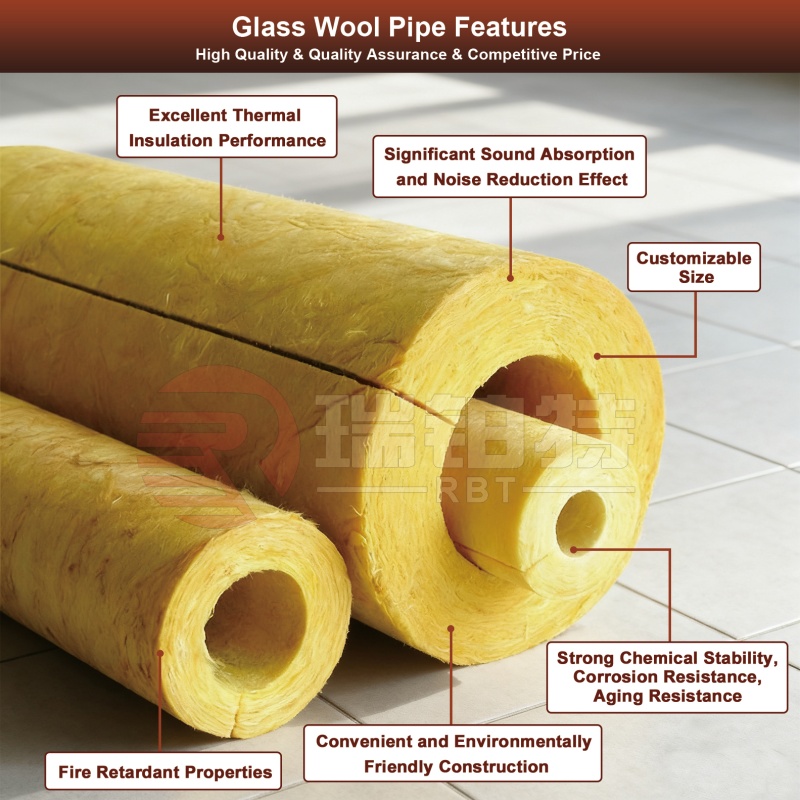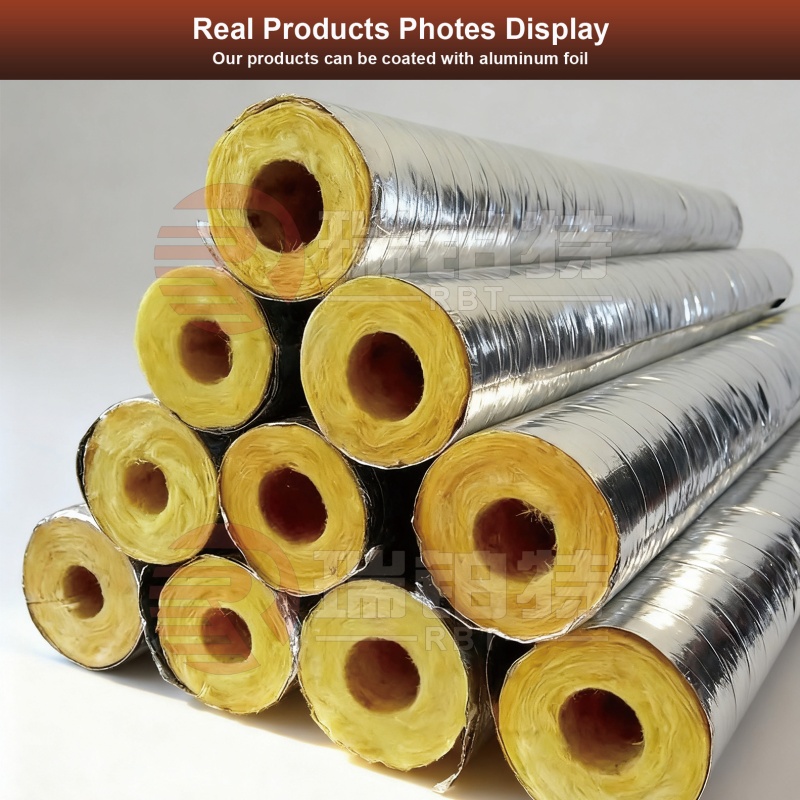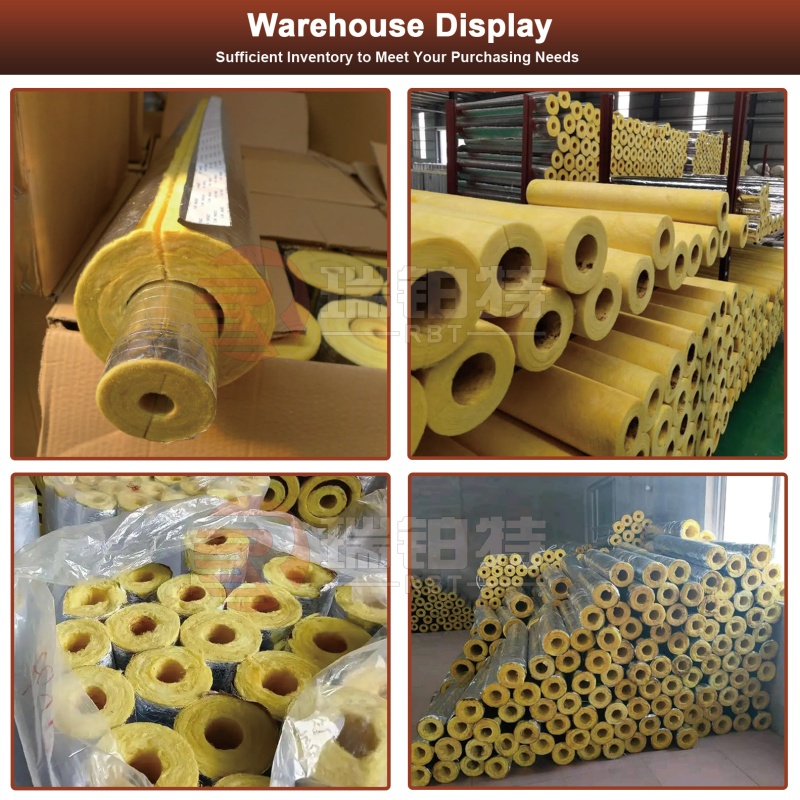
In the world of insulation solutions, glass wool pipe stands out as a reliable, cost-effective, and high-performance choice. Its unique combination of thermal insulation, fire resistance, and moisture resistance makes it indispensable across residential, commercial, and industrial sectors. Whether you`re a contractor, a building owner, or a homeowner looking to cut energy costs, understanding the diverse uses of glass wool pipe is key to making informed decisions. Below, we break down its most common and impactful applications, along with why it`s the preferred option for each scenario.
1. HVAC Systems: Keeping Temperature Control Efficient
Heating, Ventilation, and Air Conditioning (HVAC) systems are the backbone of comfortable indoor environments—but they`re also major energy consumers. Glass wool pipe plays a critical role in optimizing HVAC efficiency by insulating the pipes that carry hot or cold air throughout buildings.
How it works: Glass wool pipe has low thermal conductivity (often ≤0.035W/(m·K)), which prevents heat loss from hot water pipes or heat gain in cold water lines. This means your HVAC system doesn`t have to work as hard to maintain desired temperatures, reducing energy bills by up to 30% in some cases.
Why it`s ideal: Unlike other insulation materials, glass wool pipe is lightweight and easy to install around complex HVAC pipe layouts. It`s also fire-resistant (meeting global safety standards like Class A fire ratings) and moisture-proof, preventing mold growth or corrosion in damp HVAC environments.
Common applications: Insulating supply and return pipes for central heating, chilled water pipes in air conditioning systems, and ductwork connections in commercial buildings (e.g., offices, malls, and hospitals).
2. Plumbing Systems: Protecting Pipes Year-Round
Plumbing pipes—whether in homes, apartments, or industrial facilities—face two major threats: freezing in cold weather and heat-related damage in warm climates. Glass wool pipe insulation acts as a protective barrier, ensuring pipes function reliably and last longer.
Residential plumbing: In homes, glass wool pipe is often used to insulate water supply pipes in basements, attics, and exterior walls. It prevents pipes from freezing and bursting during winter, which can cause costly water damage. For hot water pipes, it also retains heat, so you get hot water faster while using less energy.
Commercial plumbing: In hotels, schools, and factories, large-scale plumbing systems require durable insulation. Glass wool pipe`s corrosion-resistant properties make it suitable for metal and plastic pipes alike, and its easy-to-cut design fits pipes of all sizes (from 10mm to 200mm diameter).
Specialized use case: For plumbing systems in coastal areas, glass wool pipe with moisture-resistant coatings (e.g., aluminum foil layers) adds an extra layer of protection against saltwater humidity, extending pipe lifespan.
3. Industrial Pipelines: Ensuring Safety and Product Quality
Industrial facilities—such as refineries, power plants, and chemical factories—rely on pipelines to transport liquids and gases (e.g., oil, steam, and chemicals) at specific temperatures. Glass wool pipe insulation is a must-have here, as it maintains process stability and ensures workplace safety.
Thermal control for process pipes: In refineries, pipelines carrying hot oil or steam need to stay at consistent temperatures to avoid viscosity changes or product degradation. Glass wool pipe`s high-temperature resistance (up to 300℃) makes it ideal for these applications, preventing heat loss and ensuring efficient production.
Safety compliance: Many industrial sectors have strict safety standards for fire prevention. Glass wool pipe is non-toxic, fire-retardant, and emits no harmful fumes when exposed to high heat, helping facilities meet OSHA, CE, and ISO requirements.
Noise reduction: Industrial pipelines often generate noise from fluid flow. Glass wool pipe`s sound-absorbing properties reduce noise pollution, creating a safer and more comfortable work environment for employees.

4. Renewable Energy Systems: Boosting Sustainability
As the world shifts to renewable energy (e.g., solar thermal and geothermal systems), glass wool pipe has become a key component in maximizing energy efficiency. Its eco-friendly design aligns with green energy goals, making it a sustainable choice for modern projects.
Solar thermal systems: Solar water heaters use pipes to transport heated water from collectors to storage tanks. Glass wool pipe insulation retains heat in these pipes, ensuring minimal energy loss and maximizing the system`s output—even on cloudy days.
Geothermal systems: Geothermal heat pumps rely on underground pipes to transfer heat between the earth and buildings. Glass wool pipe insulates the above-ground sections of these pipes, preventing heat exchange with the surrounding air and keeping the system efficient year-round.
Eco-friendly advantage: Unlike synthetic insulation materials, glass wool pipe is made from recycled glass (up to 70% recycled content) and is fully recyclable at the end of its lifespan. This makes it a top choice for LEED-certified green buildings and sustainable energy projects.
5. Agricultural Facilities: Supporting Crop and Livestock Health
Farms, greenhouses, and livestock barns have unique insulation needs—from regulating temperatures for crops to keeping animals comfortable. Glass wool pipe fits these needs perfectly, thanks to its affordability and versatility.
Greenhouse heating pipes: Greenhouses use hot water pipes to maintain warm temperatures for sensitive crops (e.g., tomatoes and flowers). Glass wool pipe insulation keeps these pipes hot, reducing the energy needed to heat the greenhouse and ensuring consistent growing conditions.
Livestock barns: In cold climates, barns use heating pipes to keep cows, pigs, and poultry warm. Glass wool pipe prevents heat loss, lowering heating costs for farmers while keeping animals healthy (and productive). It`s also mold-resistant, which is crucial for preventing respiratory issues in livestock.
Why Choose Glass Wool Pipe Over Other Insulation Materials?
While there are other pipe insulation options (e.g., rock wool, foam, and fiberglass), glass wool pipe offers unique advantages that make it stand out:
Cost-effective: It`s more affordable than rock wool and lasts longer than foam insulation, providing better long-term value.
Easy installation: Lightweight and flexible, it can be installed by DIYers or professionals without specialized tools.
Eco-friendly: Made from recycled materials and recyclable, it reduces your carbon footprint.
All-climate performance: Works in temperatures from -40℃ to 300℃, making it suitable for any region.
Final Thoughts: Invest in Glass Wool Pipe for Long-Term Savings
Whether you`re upgrading your home’s plumbing, optimizing an industrial process, or building a green energy system, glass wool pipe insulation delivers results. It cuts energy costs, protects your infrastructure, and meets safety and sustainability standards—all while being easy to install and maintain.
Ready to find the right glass wool pipe for your project? Explore our range of centrifugal glass wool pipe, moisture-proof glass wool pipe, and industrial-grade glass wool pipe options. We offer custom sizes, competitive pricing, and fast shipping to meet your timeline. Contact us today for a free quote!

Post time: Sep-23-2025












